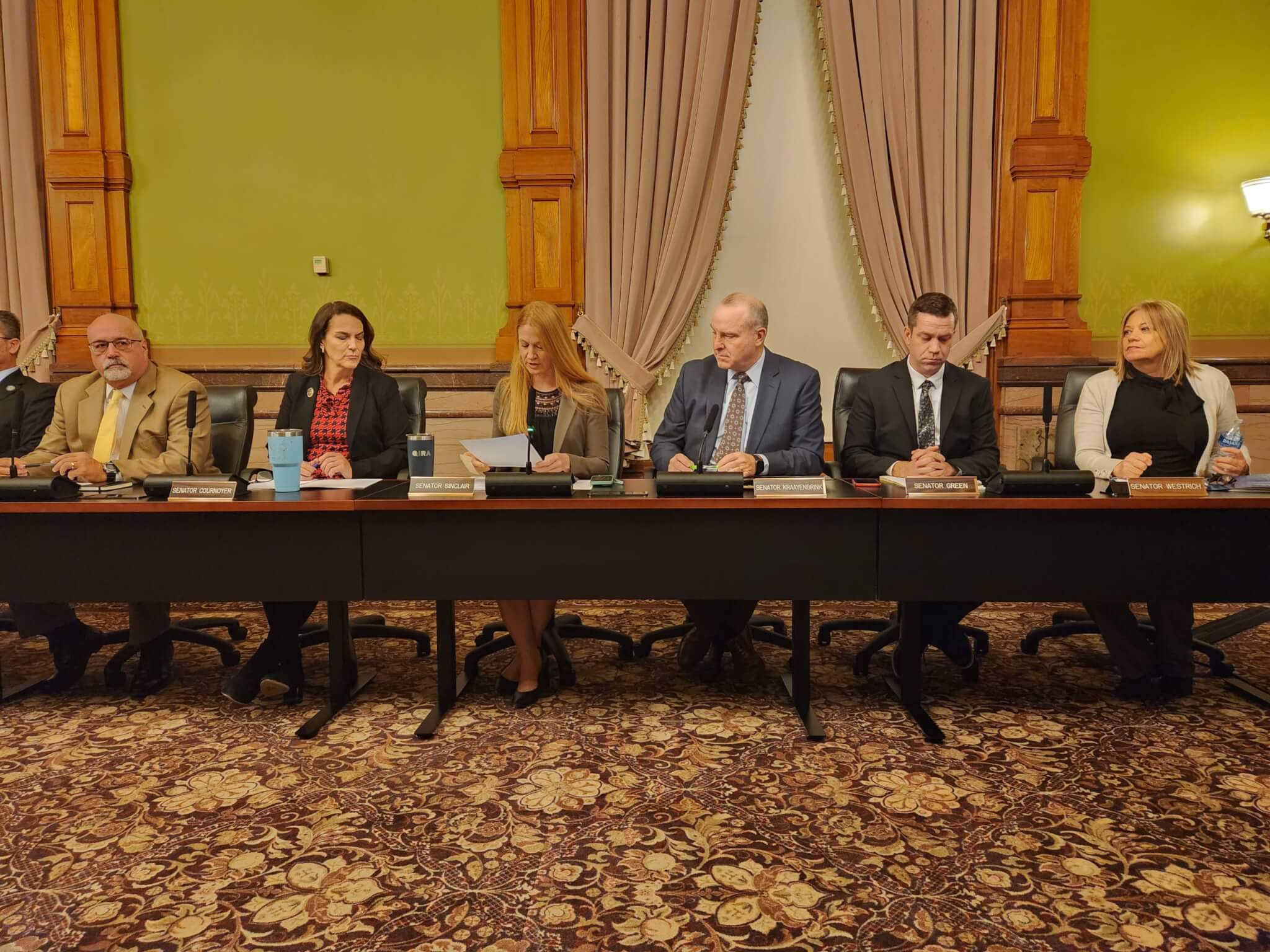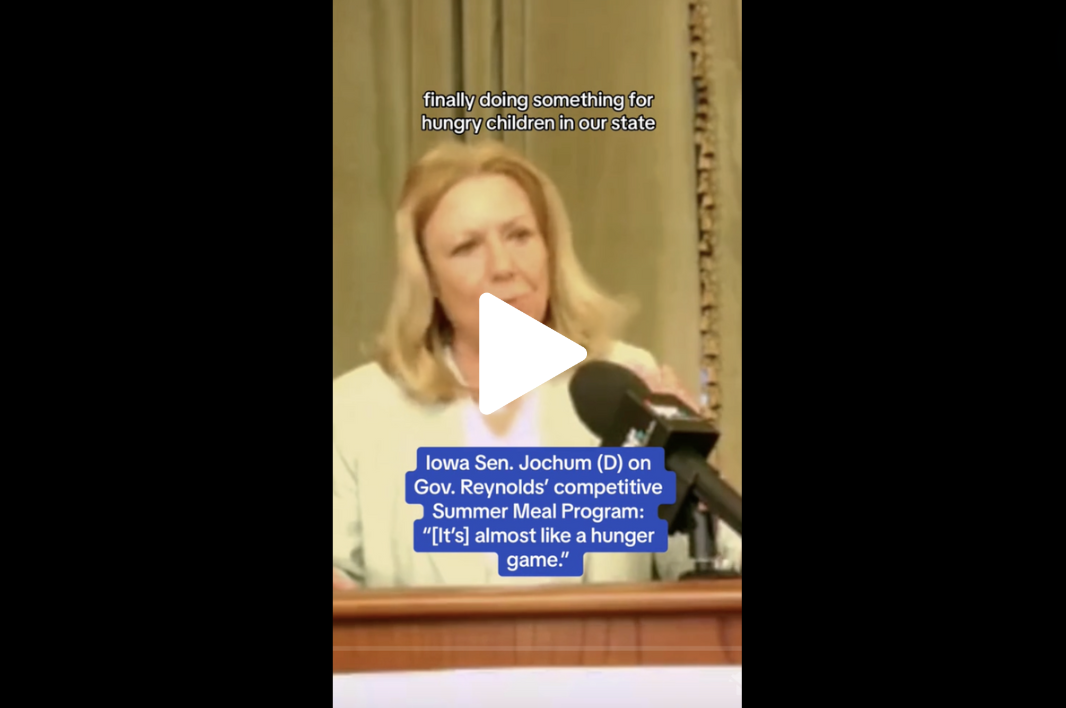
Photo by Starting Line Staff
Gov. Kim Reynolds’ private school voucher bill has passed two more milestones on its way to becoming law.
The bill passed through the Senate Education Committee Wednesday morning with an 11-5, party-line vote. It has not been decided when the bill will appear on the floor for debate, but a hearing in the Appropriations Committee has been scheduled for Thursday morning. Also on Wednesday, the Iowa House Education Reform Committee moved it to the floor after a 3-2, party-line vote. This was one day after the committee held a public hearing on the matter.
“Almost every year the first bill out of the committee has been the bill for allowable growth to build a sense of funding level for the public schools for the coming school year. I think it’s ironic that the first bill out of the chute this year is for the funding for private schools,” said Sen. Herman Quirmbach (D-Ames), the ranking Democrat on the Senate Education Committee.
[inline-ad id=0]
Democrats on the committee criticized the policy both on its contents and on the fast pace the bill has moved through different committees.
“I ask that this bill slow down so we can truly get a sense of fiscal impact and what potential guardrails we can put on it to make sure that we are being as careful as possible with our Iowa taxpayer dollars,” said Sen. Sarah Trone Garriott (D-West Des Moines).
The conversation on the committee centered around familiar complaints about accountability, equity, the impact on public schools and the overall cost of the legislation.
Senate Study Bill 1022 would create a program to direct taxpayer money into Education Saving Accounts, which parents could use to enroll their children in private schools.
[inline-ad id=”1″]
The bill has been a priority for the governor and other Republicans. It failed twice but has been fast-tracked this year.
Quirmbach spent most of his speaking time talking about the way funding will work and where money from the program will come from. His main concern was that funding for private schools was being prioritized over funding for Iowa’s public schools.
“The governor has proposed $107 million, just $106.9 million next year, for the private schools through this effort,” Quirmbach said. “That’s a big chunk of change, in fact, it’s quite a bit larger than what she is proposed for the increase for public schools: only $83 million.”
And, he pointed out, the cost for the program only expands every year, according to data from the governor’s office and other reporting. The cost goes from $107 million, up to $156 million in year two and up to $314 million in year three.
The money for the program, Quirmbach said, is coming out of what is owed to public schools, which have consistently received funding increases far below what districts have said they need to operate.
[inline-ad id=”2″]
Last year, Democrats pushed for a 5% State Supplemental Aid increase, but Republicans wouldn’t budge past 2.5%.
“I would hope that that bill would not come to the floor until the Legislative Service Agency can do a full fiscal analysis, which they have not completed,” Quirmbach said. “The numbers I quoted today are from the governor’s office, and I trust the LSA numbers a lot more.”
Senate President Amy Sinclair (R-Allerton), manager of the bill, acknowledged that point and agreed she wants to have official figures before moving the debate on the bill to the full Senate floor.
“I would like that fiscal note, which is why I have no idea when we’re going to debate because yeah, I would really like all of the information as we move forward,” she said.
She claimed the bill would save the state money
[inline-ad id=”3″]
Otherwise, she addressed the points about cost and accountability by emphasizing that education savings accounts apply to accredited nonpublic schools and are held accountable by the parents.
“I don’t know if you know what that accreditation process means. But it means you either go through the exact same accreditation process that your average public school district goes through, through the Department of Education, or you use one of the approved accrediting agencies approved by our Department of Education,” she said.
That accreditation covers curriculum, safety, teacher requirements, and education standards, the same as for public schools, Sinclair said.
[inline-ad id=”4″]
“The boards that govern nonpublic schools are far more accountable to the children and the teachers in those schools because they are their parents,” she said. “And ultimate accountability, who does that belong to? Let’s be honest with ourselves, who are we ultimately accountable to when we’re educating children? Their parents.”
She compared that to low turnout in school board elections.
Though Sinclair said she also wanted to wait for official numbers, she balked at the idea this bill has been rushed through.
“For six years I’ve been singing the same song. We have not rushed anything,” Sinclair said. “You had six years of conversation with us about us wanting to empower parents, about us wanting to get opportunities to all children. Six years, I would suggest that maybe it’s long overdue.”
Nikoel Hytrek
1/18/23
[inline-ad id=”0″]
If you enjoy stories like these, make sure to sign up for Iowa Starting Line’s main newsletter and/or our working class-focused Worker’s Almanac newsletter.
Have a story idea or something I should know? Email me at [email protected]. You can also DM me on Twitter at @n_hytrek.
Iowa Starting Line is part of an independent news network and focuses on how state and national decisions impact Iowans’ daily lives. We rely on your financial support to keep our stories free for all to read. You can contribute to us here. Also follow us on Facebook and Twitter.
Politics

Biden marks Earth Day by announcing $7 billion in solar grants
The Biden administration on Monday announced the recipients of its Solar For All Program, a $7 billion climate program that aims to lower energy...

6 terrifying things that could happen if the Comstock Act is used to target abortion
Does 1873 sound like a really, really long time ago? Well, that’s because it is—but if Republicans and far-right anti-abortion activists have their...
Local News

No more Kum & Go? New owner Maverik of Utah retiring famous brand
Will Kum & Go have come and gone by next year? One new report claims that's the plan by the store's new owners. The Iowa-based convenience store...

Here’s a recap of the biggest headlines Iowa celebs made In 2023
For these famous Iowans, 2023 was a year of controversy, career highlights, and full-circle moments. Here’s how 2023 went for the following Iowans:...





